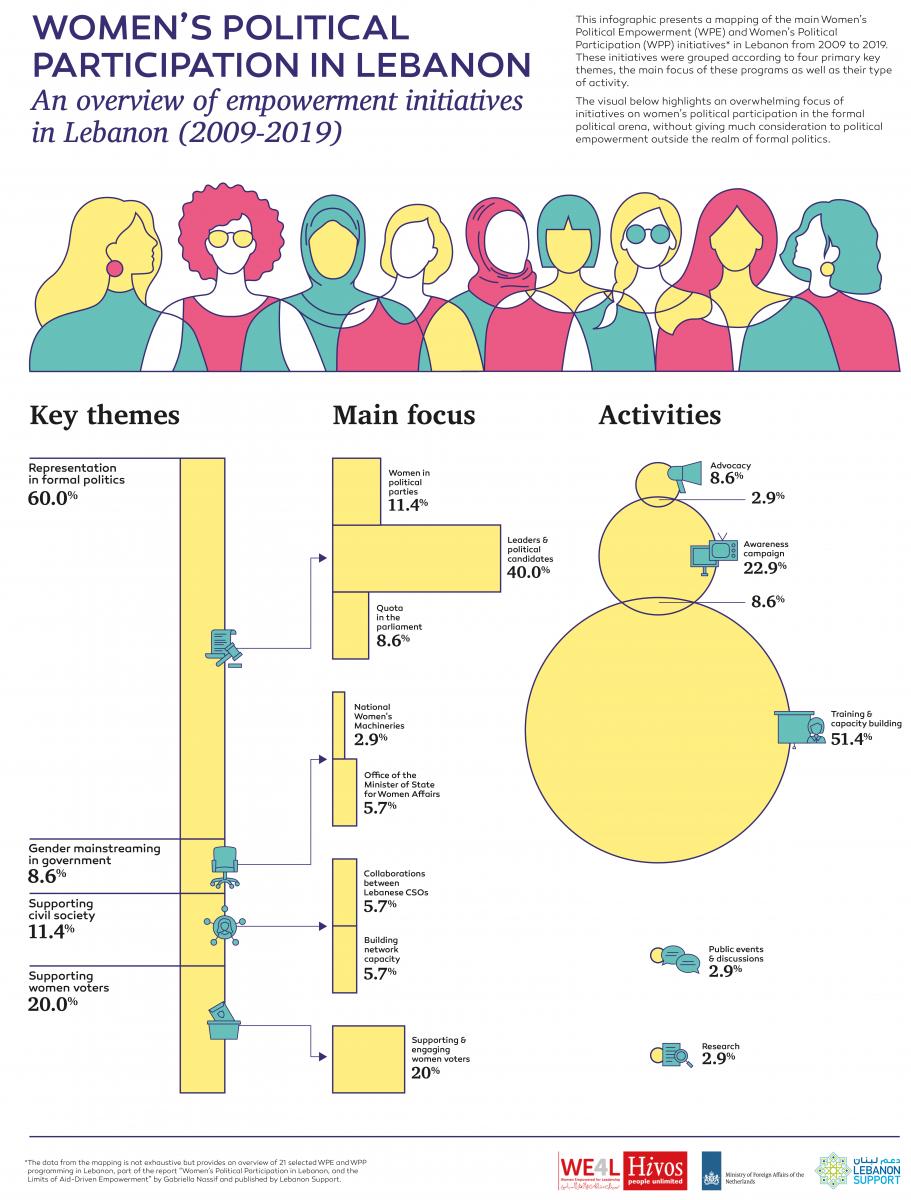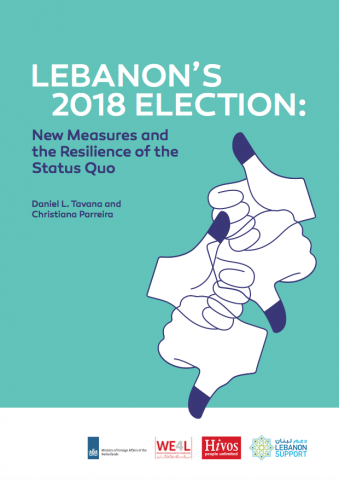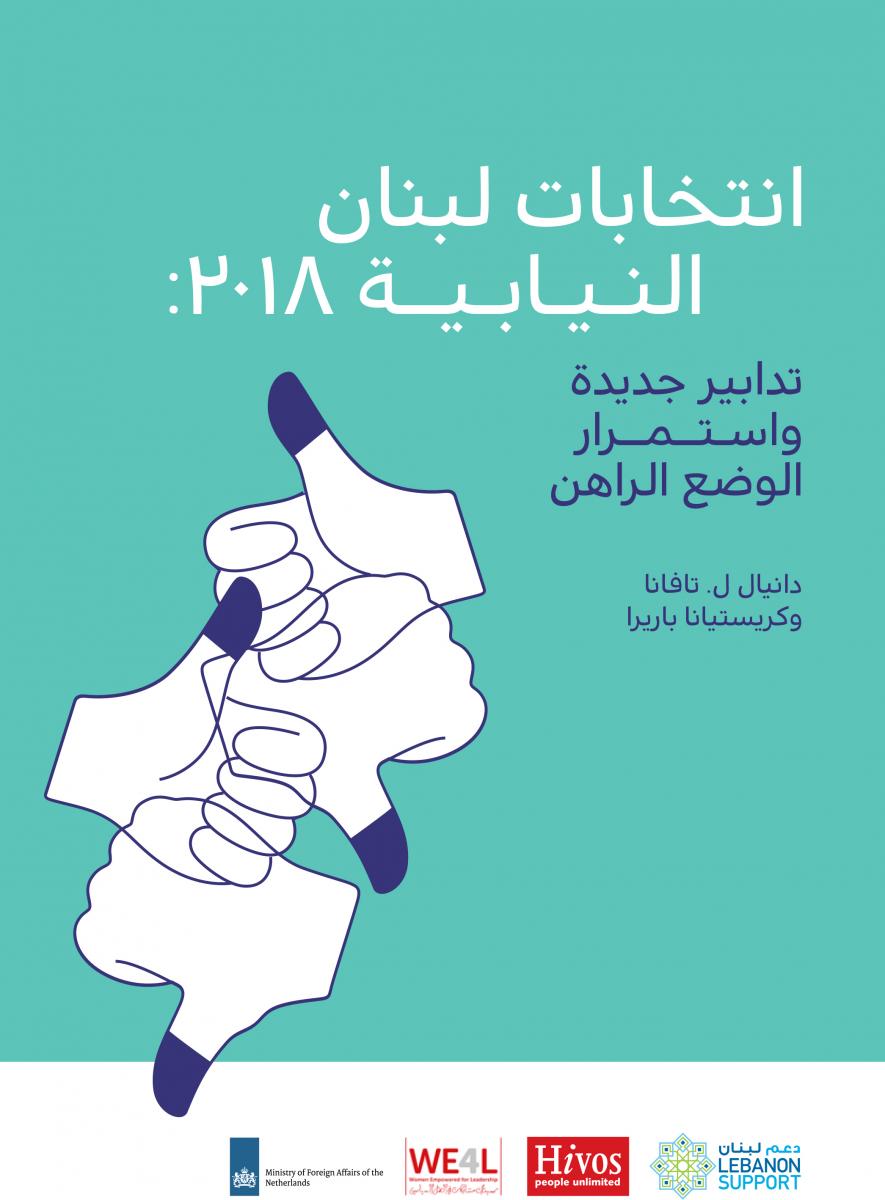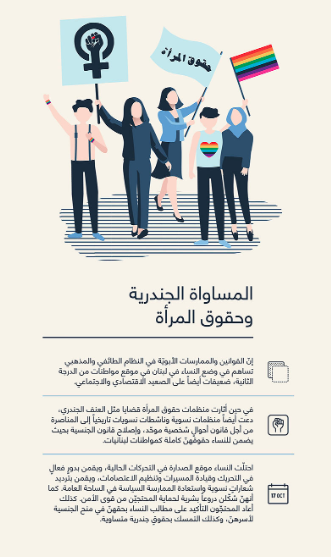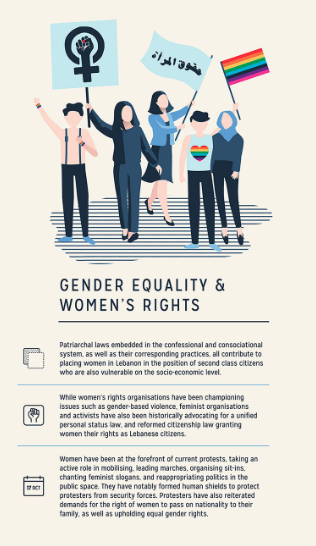Gender Equity bulletin, Issue 15, March 2020 - Focus on “Women on the forefront of change”

Issue 14, June 2019 - العدد رقم ١٤، حزيران ٢٠١٩
About this bulletin
This bulletin issue compiles our latest publications and events, with a focus on women’s broader political participation in various arenas, beyond formal electoral moments, as well as the need for more concerted action, collaboration, and solidarity among gender actors.
عن هذه النشرة
تتضمن هذه النشرة أحدث تقاريرنا ومنشوراتنا حول المشاركة السياسية للمرأة في مقاربتها الواسعة وفي حقول عدّة، وبعيداً عن المهل الانتخابية الرسمية، مع التركيز على الحاجة إلى المزيد من التعاون والتضامن بين الجهات الفاعلة في مجال الجندر في لبنان.
1. Featured resources on the Gender Equity Network - موارد مختارة على شبكة العدالة الجندرية
Women's Political Participation in Lebanon and the Limits of Aid-Driven Empowerment
مشاركة المرأة في السياسة في لبنان، وحدود التمكين في إطار مشاريع المساعدات
By Lebanon Support
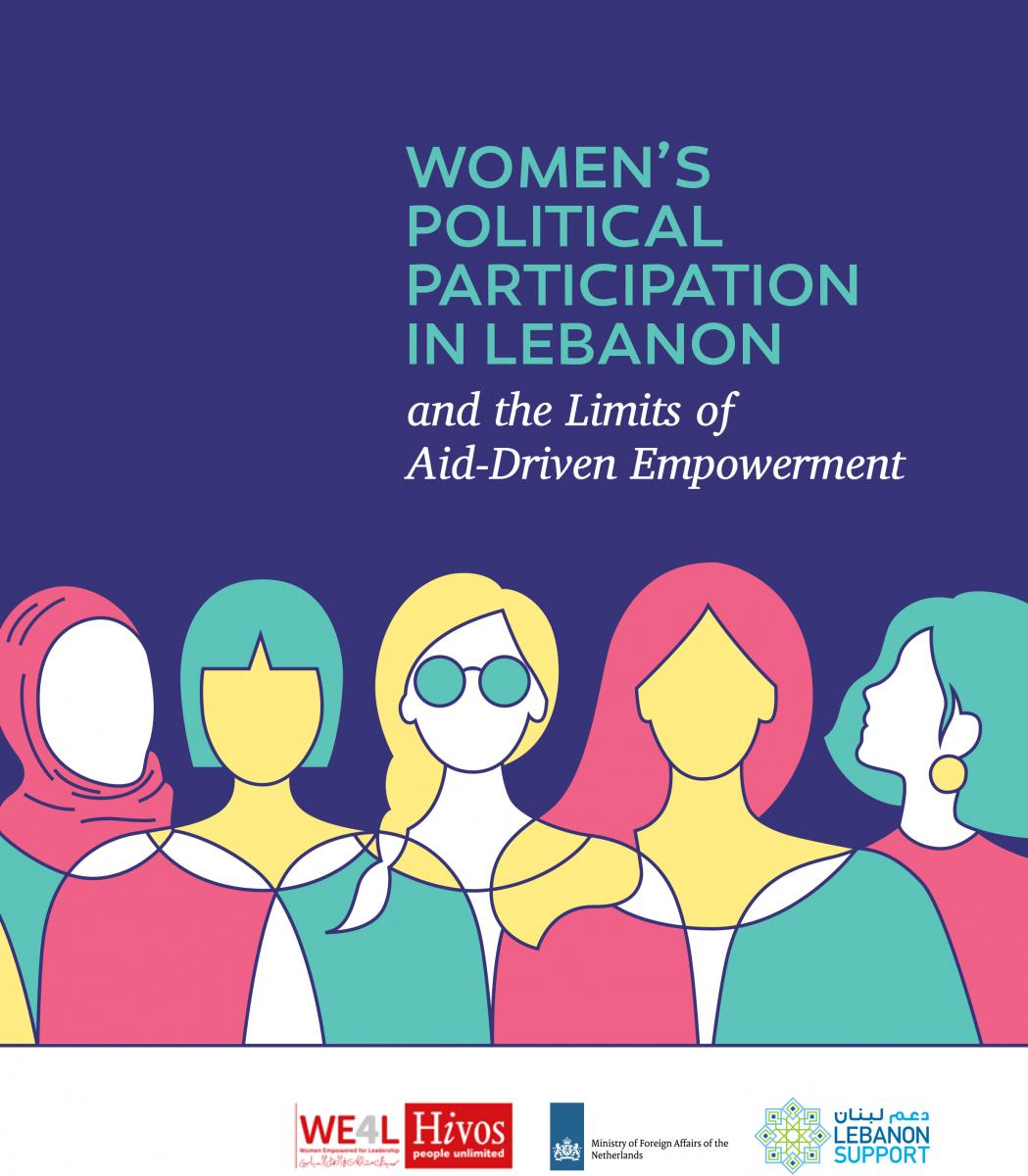
This report attempts to answer current gaps in the literature analysing WPE and WPP donor-funded initiatives in Lebanon, and asks the following question: what explains the current gap between donor-funded WPE and WPP initiatives, and the continued low rates of women’s political participation and overall low political empowerment in Lebanon?
This report is available in both English and Arabic on this link and it’s published in partnership with HIVOS through the Women Empowered for Leadership (WE4L) programme, funded by the Netherlands Foreign Ministry FLOW fund.
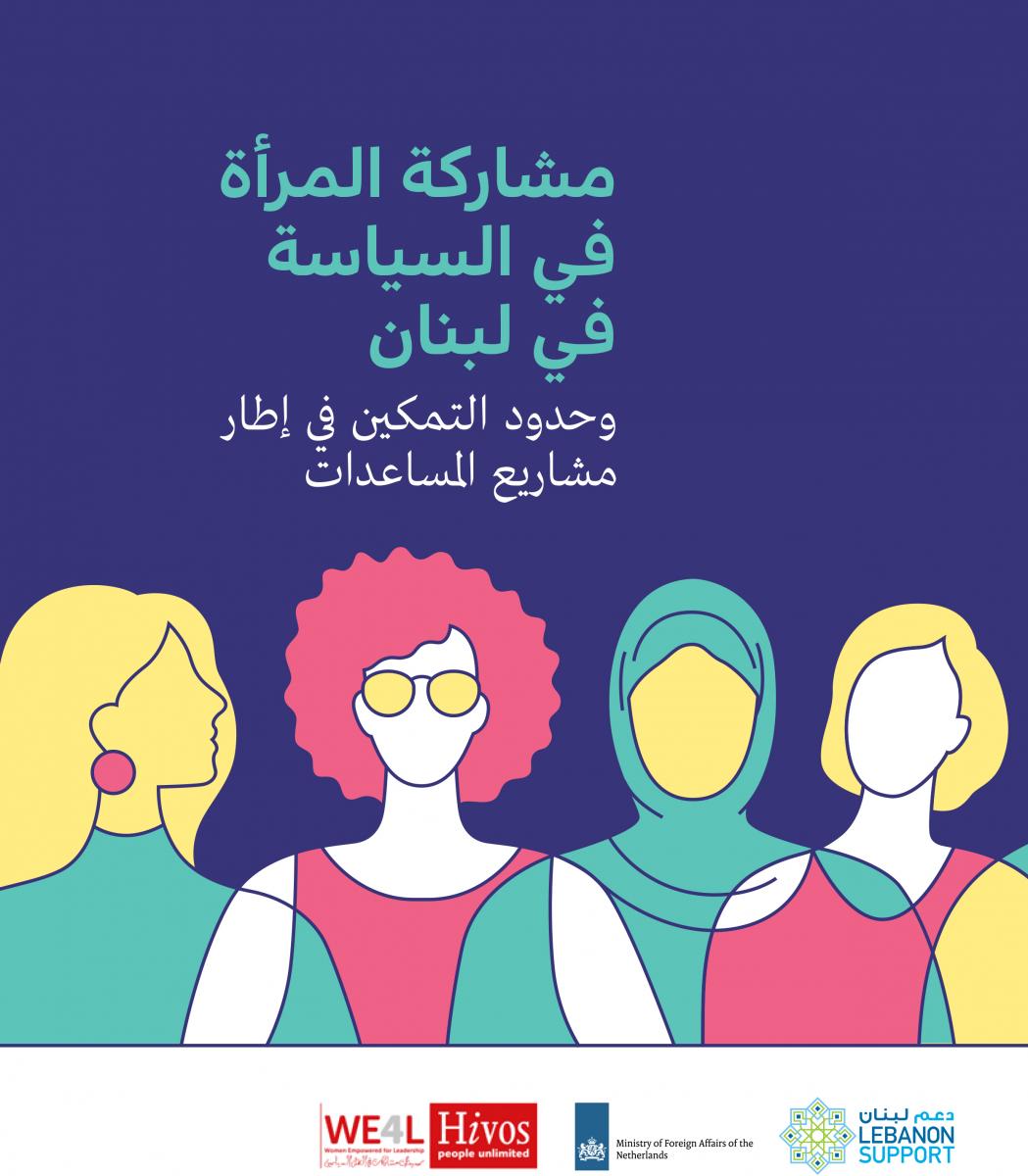
يسعى هذا التقرير إلى الاستجابة للفجوات الراهنة في الأدبيات التي تحلّل مبادرات المانحين لتمكين المرأة السياسي وتمكينها من المشاركة في السياسة في لبنان. يطرحُ التقرير السؤالَ التالي: ما الذي يفسّر الفجوة الراهنة بين مبادرات المانحين لتمكين المرأة السياسي وتمكينها من المشاركة في السياسة من جهة، وبين استمرار انخفاض معدّلات مشاركة المرأة في السياسة والتمكين السياسي المنخفض عمومًا في لبنان من جهة أخرى؟
هذا التقرير متوفر باللغتين الإنجليزية والعربية على هذا الرابط، و نُشِر بالشراكة مع هيفوس ضمن برنامج سيدات مشاركات في العمل السياسي (سمع) الممول من قبل وزارة الخارجية الهولندية، برنامج فلو (FLOW fund)
This infographic presents a mapping of the main Women’s Political Empowerment (WPE) and Women’s Political Participation (WPP) initiatives in Lebanon from 2009 to 2019. These initiatives were grouped according to four primary key themes, the main focus of these programs as well as their type of activity. The visual below highlights an overwhelming focus of initiatives on women’s political participation in the formal political arena, without giving much consideration to political empowerment outside the realm of formal politics.
This infographic is based on Lebanon Support's report titled: "Women’s Political Participation in Lebanon, and the Limits of Aid-Driven Empowerment".
It is published in partnership with HIVOS through the Women Empowered for Leadership (WE4L) programme, funded by the Netherlands Foreign Ministry FLOW fund.
You can view the infographic in English and Arabic here.
مشاركة المرأة في السياسة في لبنان لمحة شاملة عن مبادرات التمكين في لبنان (٢٠٠٩ - ٢٠١٩)
يقدّم هذا الرسم البياني مسحاً للمبادرات الرئيسية لتمكين المرأة السياسي وتمكينها من المشاركة في السياسة في لبنان بين عامي 2009 و 2019. وقد جُمعت هذه المبادرات وفقاً لموضوعاتٍ أولية رئيسية أربعة، محور التركيز الرئيسي لهذه البرامج، مداها الزمني، وكذلك نمط نشاطها. يسلّط الرسم البياني أدناه الضوء على التركيز الهائل على مبادرات مشاركة المرأة في السياسة في الحقل السياسي الرسمي، من دون إيلاء اعتبارٍ كبير للتمكين السياسي خارج عالم السياسة الرسمية.
الرسم البياني هذا مبني على بحث أعدّه مركز دعم لبنان بعنوان: "مشاركة المرأة في السياسة في لبنان، وحدود التمكين في إطار مشاريع المساعدات".
تمّ نشره بالشراكة مع هيفوس ضمن برنامج سيدات مشاركات في العمل السياسي (سمع) المموَّل من قبل وزارة الخارجية الهولندية، برنامج فلو (FLOW fund)
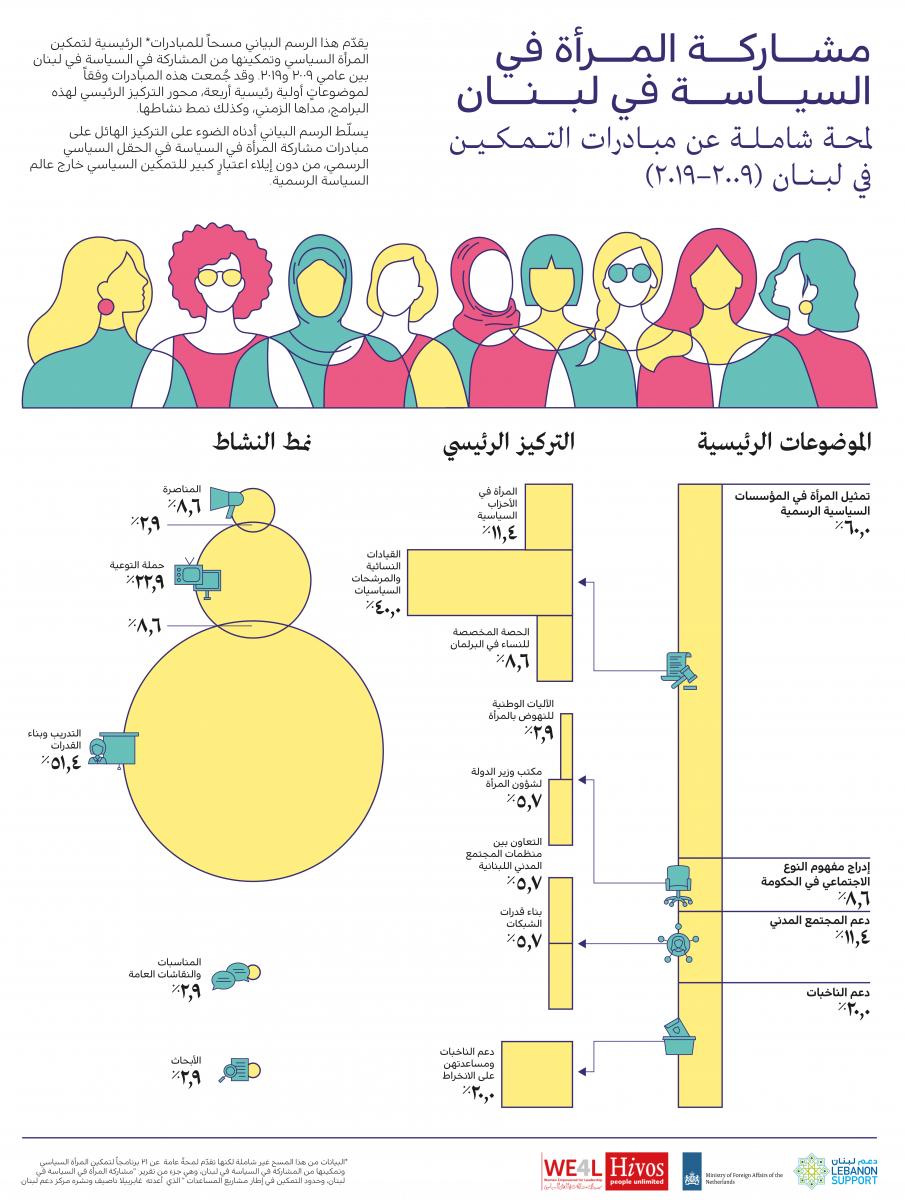
الرسم البياني متوفّر باللغتين العربية والانجليزية على هذا الرابط.
Setting the Agenda towards Gender Equity
Lebanon Support is publishing this briefing article “setting the agenda” for the policy priorities and recommendations related to gender equity and rights, ahead of International Women’s Day. The briefing article is based on extensive participatory research and consultations with actors, as well as a review of the main demands from the current social movement.
Read the full article here.
وضع الأولويات بهدف تحقيق العدالة الجندرية
ينشر مركز دعم لبنان هذا المقال بعنوان "وضع الأولويات بهدف تحقيق العدالة الجندرية" الذي يقدم الأولويات السياسية والتوصيات من أجل تحقيق العدالة الجندرية، قبيل اليوم العالمي للمرأة . يستند هذا المقال على البحوث والمشاورات الكثيفة مع الجهات الفاعلة، بالإضافة إلى إستعراض المطالب الأساسية للتحرك الاجتماعي الراهن.
اقرأ/ي المقال كاملاً على هذا الرابط.
Lebanon’s 2018 Election: New measures and the resilience of the Status Quo.
إنتخابات لبنان النيابية ٢٠١٨: تدابير جديدة واستمرار الوضع الراهن
By: Daniel L. Tavana and Christiana Parreira
This policy brief explores how—despite widespread citizen frustration—the status quo prevailed. The brief will subject the above paradoxes to greater empirical scrutiny, with particular attention to the performance of new actors. It draws findings from an analysis of election results, participant observation of the campaign period, and focus group interviews conducted before and after the election. This brief also analyses how citizen perceptions of the new electoral law, the entrance of civil society lists and movements, party resource advantages, and extra-legal modes of manipulation contributed to the reproduction of Lebanon’s electoral status quo.
This brief is published in partnership with HIVOS through the Women Empowered for Leadership (WE4L) programme, funded by the Netherlands Foreign Ministry FLOW fund.
This policy brief is available in English and Arabic.
يستكشف هذا الموجز كيف ساد الوضع الراهن - على الرغم من الإحباط المنتشر بين المواطنين. سيخضع الموجز المفارقات المذكورة أعلاه الى بحث تجريبي إضافي، مع إيلاء اهتمام خاص لأداء الفاعلين الجدد. نستخلص النتائج التي توصلنا إليها من تحليل لنتائج الانتخابات، ومراقبة المشاركين لفترة الحملة، ومقابلات جماعية مركزة أجريت قبل الانتخابات وبعدها. سيحلل هذا الموجز كيف أن تصورات المواطن في ما يتعلق بالقانون الانتخابي الجديد، ودخول لوائح وحركات المجتمع المدني، ومزايا موارد الأحزاب، وأساليب التلاعب غير القانونية ساهمت في إعادة إنتاج الوضع الانتخابي الراهن في لبنان.
تم نشر هذا الموجز بالشراكة مع منظمة هيفوس، ضمن برنامج سيدات مشاركات في العمل السياسي (سمع) الممول من قبل وزارة الخارجية الهولندية، برنامج فلو (FLOW fund)
هذا التقرير الموجز باللغة العربية و باللغة الانكليزية.
2. Events organised by Lebanon Support
الأحداث المنظمة من قبل مركز دعم لبنان
International Feminisms Festival
المهرجان العالمي للنسويات
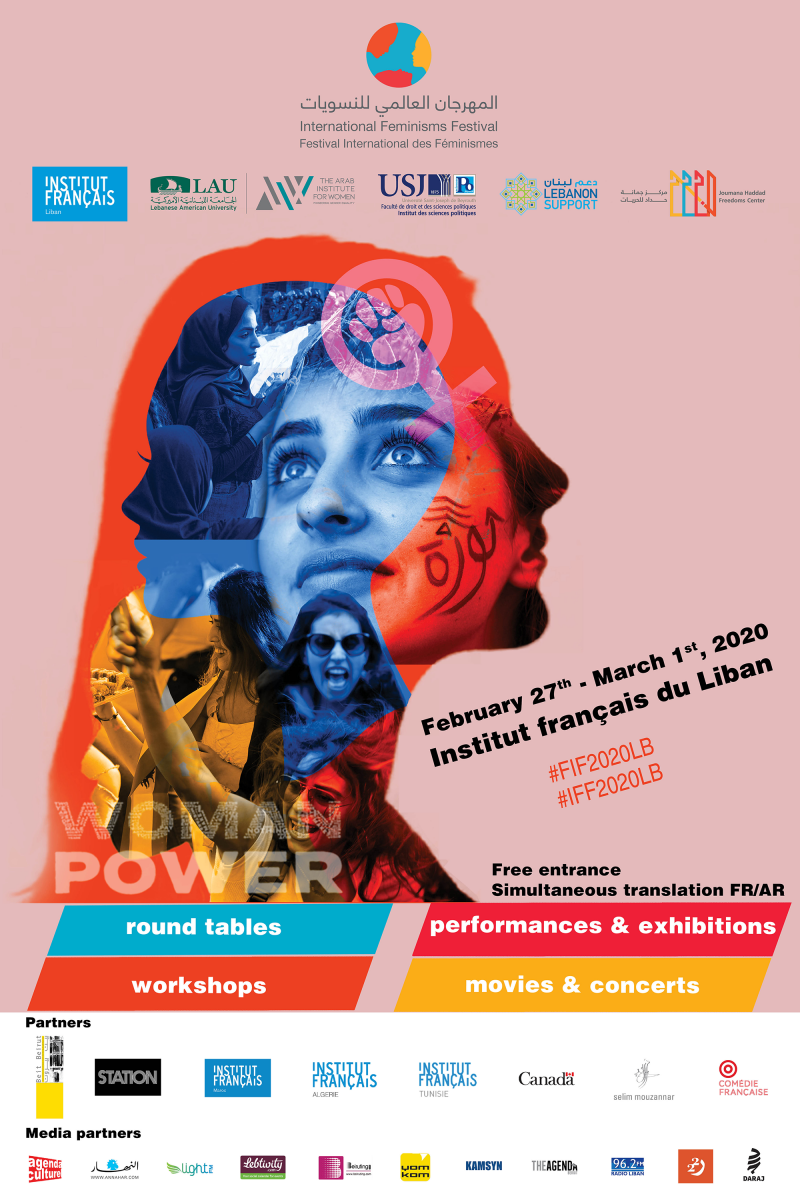
Lebanon Support was part of the organising committee of the International Feminisms Festival with L’Institut français du Liban, the Joumana Haddad Freedoms Center, the Arab Institute for Women, and l’Institut des sciences politiques de l’Université Saint-Joseph for the first time in the Middle East. This festival was dedicated entirely to the history of women movements and the issues and challenges faced by them worldwide.
The multidisciplinary programme included round tables, workshops, and art performances and gathered more than 1200 participants over the course of the four days. This event, organised by a diversity of actors, created a space for a rich programme inviting reflection, discussion, and debate on often times controversial ideas, approaches, forgotten struggles, and taboos.
A breathtaking artistic performance from Françoise Gillard, from the Comédie Francaise, shed light on the challenging and painful trajectory of abortion. The captivating retrospective of ORLAN’s works of art explored projections and preconceptions of women, and their multiple and constructed identities.
Similarly, the round tables and workshops raised controversial debates on crucial issues such as the diversity of schools of thought within feminisms and islamic feminisms notably in our region, the tension between state sponsored gender equality programmes and interventions and more grassroots feminist and LGBTIQ+ movements, the embeddedness of partirarchy in laws and praxis, as well as lively discussions on how to move forward in solidarity.
شارك مركز دعم لبنان في الهيئة التنظيمية للمهرجان العالمي للنسويات مع المركز الفرنسي في لبنان، مركز جمانة حداد للحريات، المعهد العربي للمرأة ومعهد العلوم السياسية في جامعة القديس يوسف: المهرجان العالمي للنسويات.
تضمّن المهرجان العالمي للنسويات طاولات مستديرة وورشات عمل وفعاليات فنّية وجمع المهرجان أكثر من ١٢٠٠ مشارك على مدى الأيام الأربعة. قدّم هذا المهرجان، الذي نظمته لجنة متنوّعة، برنامج غني يدعو إلى إعادة التفكير والنقاش حول قضايا مثيرة للجدل والصراعات المنسية والتابوهات.
قام الأداء الفني المذهل من قبل فرانسواز جيلارد، من Comédie Francaise، بتسليط الضوء على مسار امرأة والإجهاض. كما سلّطت الضوء استعادة أعمال ORLAN الفنيّة على الأفكار المسبقة للمرأة وهويّاتها المتعددة والمركّبة.
بالإضافة، أثارت الطاولات المستديرة وورشات العمل الجدل حول قضايا مثل تنوّع المقاربات في الحركات النسويّة والنسويّة الإسلامية، والشرخ بين برامج والتدخلات الهادفة المساواة برعاية الدولة والحركات النسوية القاعديّة وحركات الميم، وتفشّي البطركية في القوانين والممارسات، بالاضافة إلى النقاشات حول كيفية المضي قدماً في التضامن.
Gender Knowledge and Data-Sharing
تشارك البيانات والمعرفة حول الجندر
On July 9th, 2019, Lebanon Support organised a closed workshop at Ar_Ka with the attendance of representatives from various women’s rights and gender organisations such as Association Najdeh, ABAAD, Arab Institute for Women, Young Women’s Christian Association, KAFA, Harasstracker, and The Lebanese Democratic Women’s Gathering RDFL.
The workshop was organised to discuss the added value of data sharing on gender, the challenges it entails, and most importantly the necessity of such collaborative exchanges to advance collective and civic action.
نظّم مركز دعم لبنان في ٩ تموز ٢٠١٩ ورشة عمل مغلقة في Ar_Ka بحضور ممثلين عن عدّة منظمات لحقوق النساء والجندر مثل منظمة نجدة ومنظمة أبعاد وجمعية الشابات المسيحية - بيروت والمعهد العربي للمرأة ومنظمة كفى ومتعقّب التحرش والتجمّع النسائي الديمقراطي اللبناني.
نُظمت هذه الورشة لمناقشة القيمة المضافة لتشارك البيانات، والتحديّات التي تُواجَه في هذا السياق، وضرورة القيام بهذا العمل التشاركي من أجل تعزيز العمل العام المدني والمشترك.
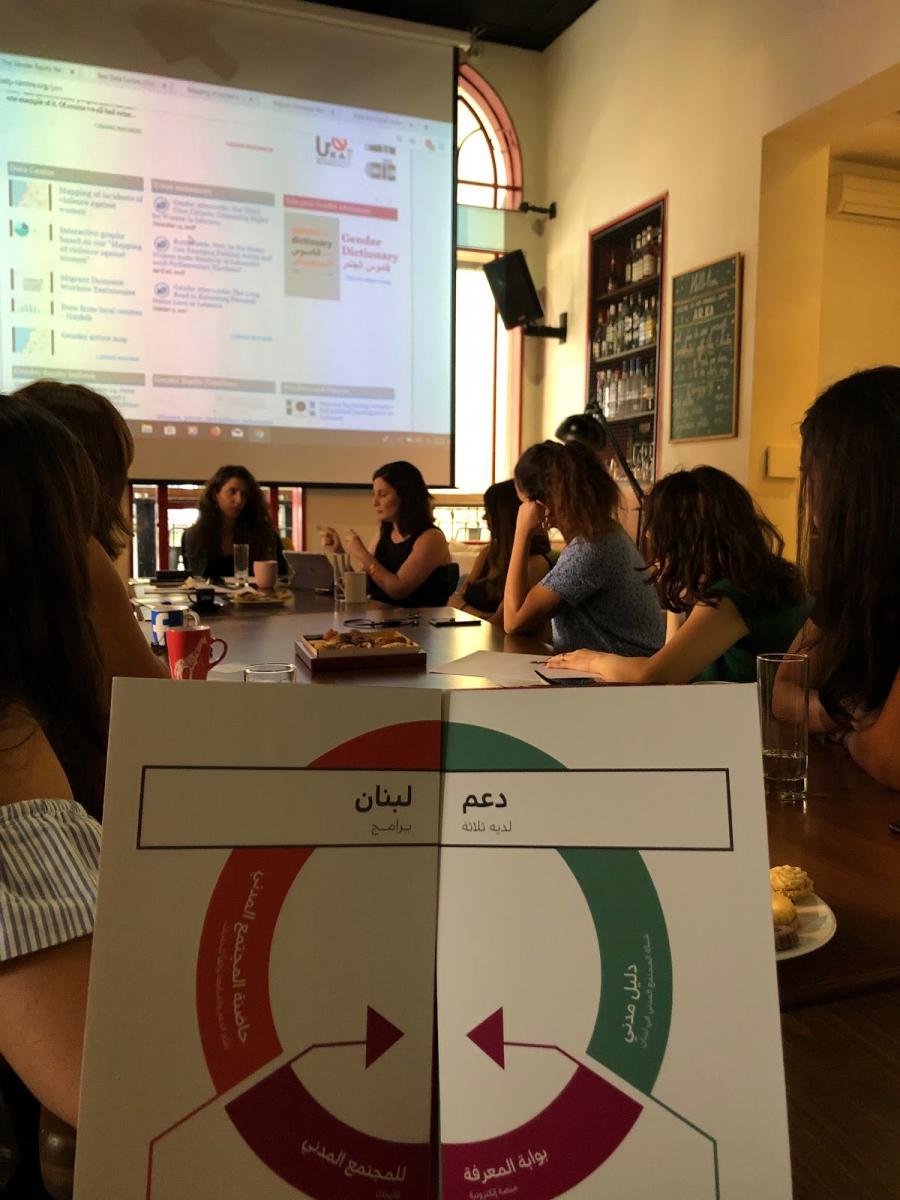
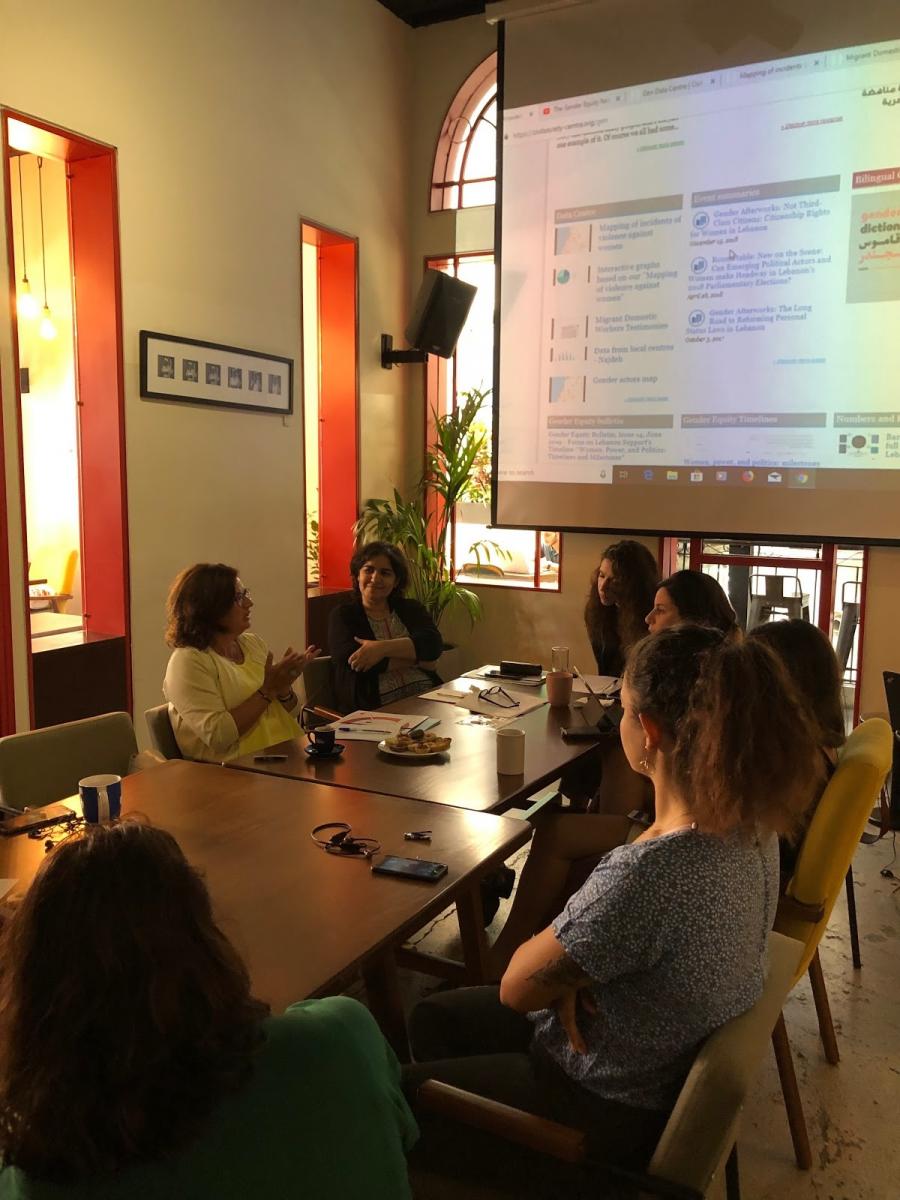
The workshop was organised as part of a project supported by Diakonia within our Gender Equity Network.
نُظِّمت هذه الورشة كجزء من مشروع بالشراكة مع دياكونيا من ضمن شبكة العدالة الجندري
FOCUS ON - أضواء على
Women as agents of change - المرأة عنصر التغيير
Women have been mobilising for change since the 1920s, and more so after 1953 when they were granted suffrage. At the front lines of change, they have demanding greater gender equality in accessing socio-economic and political rights.
For more on women’s movements, explore the timeline of “Women, power, and politics: milestones from Lebanon” which documents historical, social, and political achievements, notable events, and outstanding figures of the women’s movements in Lebanon as well as pioneering leader women’s trajectories.
You can also explore the interactive timeline “Women's Movements in Lebanon” retracing mobilisations relevant to gender since the 1920s, for a historical overview of feminist and women’s movement in Lebanon.
Additionally, the interactive timeline “Women's achievements in Lebanon” compiles women’s achievements in Lebanon dating back to 1953 with gaining suffrage and the right to be elected, to more contemporary ones in 2014, such as the promulgation of the law protecting women from family violence, and the extension of maternity leave.

للمزيد من المعلومات حول التحركات النسوية قوموا بزيارة الجدول الزمني بعنوان"النساء والسلطة والسياسة: إنجازات بارزة في لبنان" الذي يوثق الإنجازات التاريخية والاجتماعية والسياسية، كما الأحداث والشخصيات البارزة للتحركات النسوية في لبنان، بالإضافة إلى مسارات نساء رائدات.
اطلعوا أيضاً على جدولنا الزمني التفاعلي بعنوان "الحركات النسائية في لبنان" الذي يستعيد تاريخ الحركات المرتبطة بالجندر منذ عشرينيات القرن الماضي، للمحة تاريخية عامة عن التحركات النسوية والنسائية في لبنان.
يعرض الجدول الزمني التفاعلي بعنوان "إنجازات النساء في لبنان" إنجازات النساء ابتداءً من العام ١٩٥٣ مع اكتساب الحق في الاقتراع والترشح، إلى الإنجازات الأكثر معاصرة في عام ٢٠١٤ كإقرار قانون حماية المرأة من العنف الأسري وتمديد إجازة الأمومة.
Protests have been ongoing in Lebanon since October 17 2019, in an unprecedented geographic spread, largely motivated by demands to access socio-economic rights, which are part and parcel of human rights. This infographic visualises these demands, shedding light on the role of civil society actors in mobilising on these issues throughout the years, and in creating and framing rights-based demands and discourses.
تتواصل التحركات الاجتماعية في لبنان منذ ١٧تشرين الأوّل ٢٠١٩ في انتشار جغرافي غير مسبوق، والدافع الأساسي وراءها هو المطالبة بالحصول على الحقوق الاقتصادية والاجتماعية والتي تشكل جزء أساسي من حقوق الإنسان. يظهر هذا الرسم البياني هذه المطالب، مسلّطاً الضوء على دور الجهات الفاعلة في المجتمع المدني في التحرّك حول هذه القضايا على مرّ السنين، وفي خلق وصياغة المطالب والخطابات القائمة على أساس الحقوق.
4. Newest gender organisations registered on Daleel Madani
الفاعلين المختصّين بالجندر المسجّلين حديثًا على دليل مدني
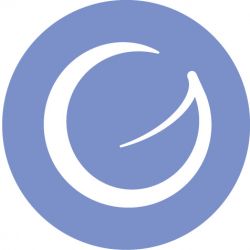
Global Partners Governance:
View their profile on Daleel Madani here:
Global Partners Governance is a social purpose company working to strengthen political institutions and improve the quality of representation around the world.
حوكمة الشركاء العالميين
اضغط/ي هنا لصفحة المنظمة على دليل مدني
حوكمة الشركاء العالميين هي شركة ذات هدف اجتماعي تعمل على تعزيز المؤسسات السياسية وتحسين نوعية التمثيل في جميع أنحاء العالم.
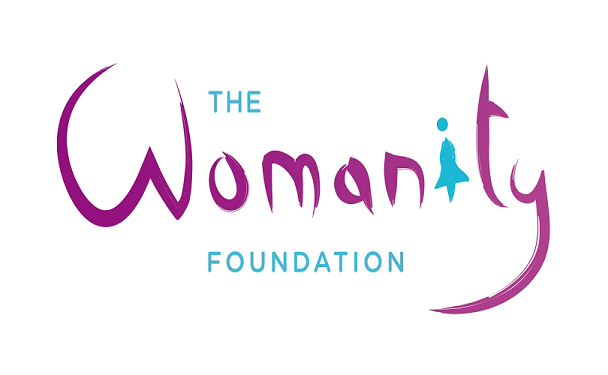
The Womanity Foundation
View their profile on Daleel Madani here:
Womanity believes that the media can play an influential role in affecting societal norms, and gender relations.
مؤسسة Womanity
اضغط/ي هنا لصفحة المنظمة على دليل مدني
تؤمن مؤسسة Womanity أن وسائل الإعلام تستطيع أن تلعب دوراً مهماً في التأثير على المعايير الاجتماعية والعلاقات الجندرية.
Gender news - أخبار الجندر
Focus on women’s mobilisations in Lebanon since October 17th, 2019
- The protests have provided women and the LGBTQIA community with a public space to voice their demand for socio-political change, by re-examining homophobic sentiments in mainstream society.
- On November 3, multiple feminist NGOs and a large crowd marched from the National Museum of Beirut to Martyr’s Square chanting that “the revolution is a woman,” while also commemorating activist Nadine Jouni whom died in a car accident earlier in October.
- On November 6, thousands attended a women’s candle-lit vigil in Martyr’s Square in Beirut, denouncing rampant corruption.
- On November 9, women marched in Rachaiya denouncing financial institutions, unregulated capital controls, and the pauperisation of the Lebanese people.
- On November 12, women protested in Moucharafieh demanding greater social protection.
- On November 17, women marched in Kfar Roummane demanding greater social protection.
- On November 23, a feminist march was organised in Sour along right-based demands relating to granting women equal citizenship rights, reforms regarding family laws, and the toppling of sectarianism. They also sat-in in front of the Central Bank denouncing capital controls.
- On November 30, women from Khanda’ Ghami’ and Achrafieh jointly marched to promote peaceful co-existence, and to counter the tension between residents resulting from incidents the day before. Indeed, women have exerted efforts to maintain the non-violent nature of the protests.
- On December 1, women in Saida organised a march denouncing incidents of conflict and repression, and the prevalence of rampant corruption, all the while demanding the unification of the Lebanese people
- On December 7, groups of women marched through the streets of Beirut to protest sexual harassment and bullying and demanding rights including the passing of citizenship to children of Lebanese women married to foreigners. Additionally, on the same day, women in Marjaaiyoun and Hasbaiya organised a sit-in denouncing the deterioration of socio-economic living conditions.
- On December 9, many marched from Bliss street to Riad el Solh, protesting against Gender-Based Violence (GBV).
- Several female journalists have witnessed physical or verbal assaults during the protests, some of which are Dima Sadek, Joyce Akiki, and Nawal Berry.
Lebanon’s top military prosecutor has for a second time ruled not to file charges against an Army officer for “homosexual activity,” despite alleged pressure from the former defense minister.
التركيز على التحركات الاجتماعية للنساء في لبنان منذ ١٧تشرين الأول، ٢٠١٩
- زودت الاحتجاجات النساء ومجتمعات الميم بمساحة عامة للتعبير عن المطالبة بالتغيير الاجتماعي السياسي، من خلال الحثّ على إعادة النظر في المشاعر المناهضة للمثلية في المجتمع.
- في ٣ تشرين الثاني، سارت عدّة منظمات غير حكومية نسوية وحشد كبير من الناس من المتحف الوطني في بيروت إلى ساحة الشهداء مرددين هتافات "الثورة أنثى"، كما قمن بتحية ذكرى الناشطة نادين جوني التي توفيت في حادث سيارة خلال تشرين الأول.
- في ٦ تشرين الثاني، حضر الآلاف من النساء وقفة إضاءة الشموع في ساحة الشهداء في بيروت، منددين بالفساد المتفشي.
- في ٩ تشرين الثاني، سارت مجموعات من النساء في راشيا منددين بحكم المصرف والسياسات المالية وإفقار الناس.
- في ١٢ تشرين الثاني، احتجت النساء في المشرفيه للمطالبة بزيادة الحماية الاجتماعية.
- في ١٧ تشرين الثاني، سارت النساء في كفررمان للمطالبة بزيادة الحماية الاجتماعية.
- في ٢٣ تشرين الثاني، نُظمت مسيرة نسوية في صور للمطالبة بحقوق متساوية في المواطنة وإصلاحات تتعلق بقوانين الأسرة والإطاحة بالنظام الطائفي. كما قِمن بالاعتصام أمام البنك المركزي لإدانة الضوابط المصرفية على رأس المال.
- في ٣٠ تشرين الثاني، تشاركت نساء من الاشرفية ومن خندق الغميق في مسيرة من أجل التعايش السلمي، وتخفيف التوتر بين السكان نتيجة الحوادث التي وقعت في اليوم السابق. وقد بذلت النساء جهوداً للحفاظ على الطبيعة السلمية للتحركات حتى الآن.
- في ١ كانون الأول، نظمت النساء في صيدا مسيرة تندد بالقمع، وانتشار الفساد المتفشي، في حين طالبن بتوحيد الشعب اللبناني.
- في ٧ كانون الأول، سارت مجموعات من النساء في شوارع بيروت احتجاجاً على التحرش الجنسي والتنمر، مطالبةً بحقوق تشمل منح الجنسية لاطفال اللبنانيات المتزوجات من أجانب. بالإضافة إلى ذلك، نظمت النساء في مرجعيون وحاصبيا في نفس اليوم اعتصاماً للتنديد بتدهور الأحوال المعيشية الاجتماعية والاقتصادية.
- في ٩ كانون الأول، سار العديد من الناس من شارع بليس إلى ساحة رياض الصلح، احتجاجاً على العنف القائم على النوع الاجتماعي.
- قد شهدت عدة صحافيات اعتداءات جسدية أو لفظية خلال التحركات، منها ديما صادق، جويس عقيقي، ونوال برّي.
- قرر المدعي العام العسكري الأعلى في لبنان للمرة الثانية عدم توجيه الاتهام إلى ضابط في الجيش بتهمة "المجامعة على خلاف الطبيعة"، وذلك على الرغم من الضغط المزعوم من وزير الدفاع السابق بالقيام بهذا.
Around the world
- Radwa Mohamed, a 25-year-old Egyptian activist, was arrested after she posted a video denouncing the regime and criticizing President Abdel Fattah el-Sisi's wife, sparking a social media campaign and drawing global condemnation.
- In December, Saudi Arabia ended gender-segregated entrances for restaurants and eased other restrictions, including bans on women driving.
- Chilean anti-rape protest song about rape culture and victim shaming has become a viral anthem for feminists around the world.
- Turkey proposes a ‘marry your rapist’ bill, which pardons men convicted of statutory rape, if they marry their victim.
حول العالم
- تم توقيف رضوى محمد الناشطة المصرية البالغة من العمر 25 عاماً بعد أن نشرت شريط فيديو يدين النظام وينتقد زوجة الرئيس عبد الفتاح السيسي، مما أثار حملة إعلامية اجتماعية واستنكار حول العالم.
- ألغت المملكة العربية السعودية في كانون الأول مداخل المطاعم التي تفصل بين الجندرين، وخففت من القيود الأخرى، بما في ذلك حظر قيادة النساء للسيارات.
- تحولت أغنية التحركات الشيلية المناهضة للاغتصاب إلى نشيد منتشر بين النسويات في مختلف أنحاء العالم.
- اقترحت تركيا قانون "زواج المغتصب" الذي يوفر العفو عن الرجال المدانين بالاغتصاب، وذلك إذا تزوجوا ضحيتهم.
This bulletin is published as part of the Gender Equity Network, a project by Lebanon Support. It was developed in partnership with Diakonia.
The Gender Equity Network (GEN) is an online thematic and collaborative project, part of Lebanon Support’s Civil Society Knowledge Centre (CSKC).
نشرة العدالة الجندرية هي جزء من شبكة العدالة الجندرية، مشروع لمركز دعم لبنان. تمّ تطويرها ونشرها بالشراكة مع دياكونيا. شبكة العدالة الجندرية جزء من بوابة المعرفة للمجتمع المدني (CSKC)، أحد برامج مركز دعم لبنان.


